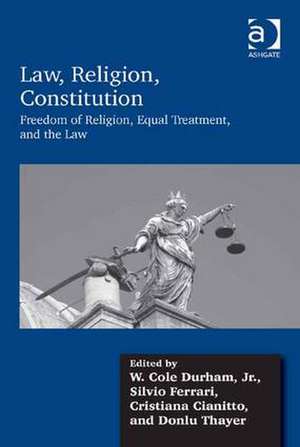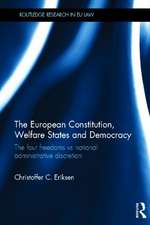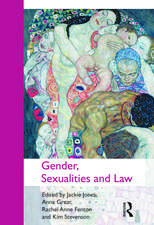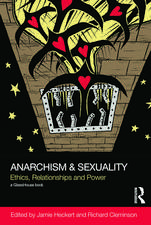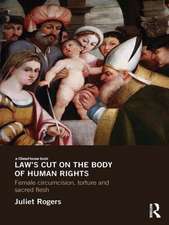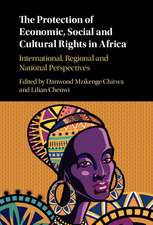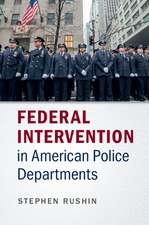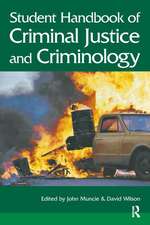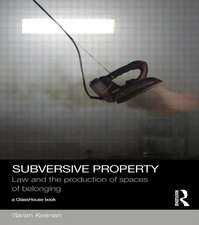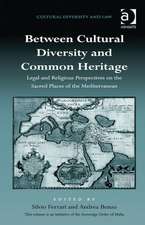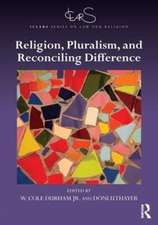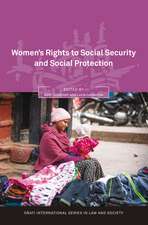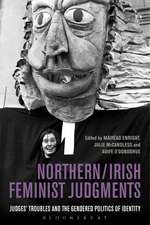Law, Religion, Constitution: Freedom of Religion, Equal Treatment, and the Law
Autor W. Cole Durham, Silvio Ferrari, Cristiana Cianitto, Donlu Thayeren Limba Engleză Hardback – 27 aug 2013
| Toate formatele și edițiile | Preț | Express |
|---|---|---|
| Paperback (1) | 398.35 lei 6-8 săpt. | |
| Taylor & Francis – 30 iun 2020 | 398.35 lei 6-8 săpt. | |
| Hardback (1) | 1072.08 lei 6-8 săpt. | |
| Taylor & Francis – 27 aug 2013 | 1072.08 lei 6-8 săpt. |
Preț: 1072.08 lei
Preț vechi: 1307.42 lei
-18% Nou
Puncte Express: 1608
Preț estimativ în valută:
205.14€ • 214.76$ • 169.74£
205.14€ • 214.76$ • 169.74£
Carte tipărită la comandă
Livrare economică 05-19 aprilie
Preluare comenzi: 021 569.72.76
Specificații
ISBN-13: 9781472416131
ISBN-10: 1472416139
Pagini: 252
Ilustrații: Includes 3 b&w illustrations
Dimensiuni: 156 x 234 x 25 mm
Greutate: 0.95 kg
Ediția:New ed
Editura: Taylor & Francis
Colecția Routledge
Locul publicării:Oxford, United Kingdom
ISBN-10: 1472416139
Pagini: 252
Ilustrații: Includes 3 b&w illustrations
Dimensiuni: 156 x 234 x 25 mm
Greutate: 0.95 kg
Ediția:New ed
Editura: Taylor & Francis
Colecția Routledge
Locul publicării:Oxford, United Kingdom
Cuprins
Law, Religion, Constitution
Notă biografică
W. Cole Durham Jr., is Director of the International Center for Law and Religion Studies, a position he has held since the Center was officially organized on January 1, 2000. A graduate of Harvard College and Harvard Law School, where he was a Note Editor of the Harvard Law Review and Managing Editor of the Harvard International Law Journal, Professor Durham has been heavily involved in comparative law scholarship, with a special emphasis on comparative constitutional law. He is currently the President of the International Consortium for Law and Religion Studies (ICLARS) and a Co-Editor-in-Chief of the Oxford Journal of Law and Religion. He served from 1997-2013 as a member of the OSCE/ODIHR’s Advisory Council on Freedom of Religion or Belief. He is a Vice President of the International Academy for Freedom of Religion and Belief and has served as a board member of church-state centers at DePaul and Baylor Universities, of the International Religious Liberty Association, and of the International Advisory Board of the Oslo Coalition on Freedom of Religion or Belief. Silvio Ferrari is Professor of Law and Religion at the University of Milan. Visiting professor at the University of California (Berkeley, 1994 and 2001), the Institute for Advanced Legal Studies (London, 1998-99) and the Ecole Pratique des Hautes Etudes (Paris, Sorbonne, 2004). His main fields of interest are law and religion in Europe, comparative law of religions (particularly Jewish law, Canon law and Islamic law) and the Vatican policy in the Middle East. He is honorary president of ICLARS (International Consortium for Law and Religion Studies) and a member of the International Academy of Comparative Law. He is also one of the editors-in-chief of the Oxford Journal of Law and Religion and member of the Editorial Board of the Ecclesiastical Law Journal (Cambridge Univ. Press). Dr Cristiana Cianitto is a lecturer at the University di Milan. She also teaches Anglican Canon Law in the Faculty of Theol
Recenzii
’This book admirably delivers a very clear picture of our past and present struggle with constitutional protection of religious diversity on a national and trans-national scale. It illustrates the current theoretical debate on state neutrality, separation of church and state, religious liberty, equality and the rights of faith communities. With a rich panoply of authors, cases, topics and viewpoints, the book identifies the challenge of religious diversity to constitutional law in the post-secular age.’ Marco Ventura, KU Leuven University, Belgium
Descriere
What is the place assigned to religion in the constitutions of contemporary States? What role is religion expected to perform in the fields that are the object of constitutional regulation? Is separation of religion and politics a necessary precondition for democracy and the rule of law? These questions are addressed in this book through an analysis of the constitutional texts that are in force in different parts of the world. The final section of the book is devoted to the discussion of the constitutional regulation of some particularly controversial issues, such as religious education, the relation between freedom of speech and freedom of religion, abortion, and freedom of conscience.
